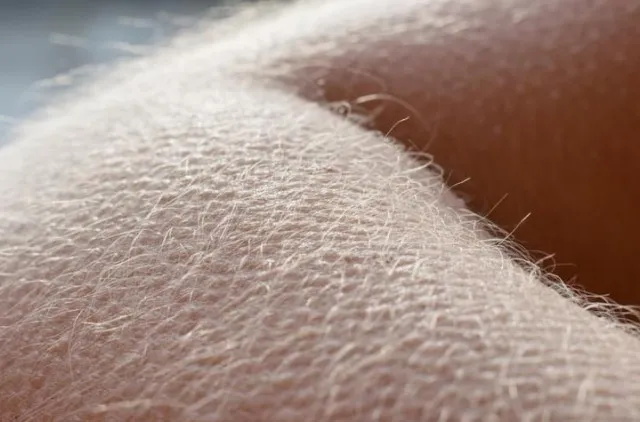Ever felt those tiny bumps rise on your skin during a powerful moment? Whether it’s a moving performance, a sudden chill, or an intense memory, goosebumps are a fascinating response our bodies create. But what exactly causes them? Let’s dive into the science and emotions behind this intriguing phenomenon.

What Are Goosebumps?
Goosebumps, scientifically known as piloerection, occur when small muscles at the base of your hair follicles contract. This contraction makes the hair stand upright, resulting in the tiny bumps visible on your skin.
This response is often automatic, triggered by specific stimuli like cold or strong emotions. While it might seem like a minor quirk of the body, it’s deeply tied to our evolutionary history and emotional experiences.
The Science Behind Goosebumps
The appearance of goosebumps is connected to your body’s fight-or-flight response. This primal reaction prepares you to face potential threats, even if there’s no immediate danger in modern contexts.
Adrenaline’s Role
When you experience intense emotions—fear, excitement, or awe—your brain signals the release of adrenaline. This hormone causes various physiological changes, including:
- Increased heart rate
- Heightened alertness
- Contraction of the tiny muscles attached to hair follicles
This contraction creates the raised hair and the characteristic bumps we call goosebumps. The response is an automatic byproduct of the body’s preparation for action.
Goosebumps: A Throwback to Evolution
Goosebumps are a vestige of our evolutionary past. Early humans, who were much hairier, benefited from this reaction in two ways:
- Thermal Insulation: Raised hair trapped a layer of air close to the skin, helping retain warmth in cold conditions.
- Intimidation: In moments of fear, the appearance of raised hair made individuals look larger, potentially deterring predators or threats.
While humans have evolved to have much less body hair, the mechanism remains intact, even if it’s no longer as functional as it once was.

Goosebumps appear as your body responds to strong emotions or cold. Image Credit: Getty
Why Do Strong Emotions Trigger Goosebumps?
Goosebumps aren’t just about temperature regulation; they’re also deeply tied to our emotional experiences.
Fight-or-Flight and Fear
When you watch a suspenseful movie or hear a sudden loud noise, your body perceives a threat. Even if you’re not in actual danger, your fight-or-flight response activates, leading to the release of adrenaline and the appearance of goosebumps.
Moments of Awe or Inspiration
Have you ever felt goosebumps during a powerful song or an inspiring speech? These emotional goosebumps occur when your brain connects deeply with the moment. It’s your body’s way of amplifying the experience, making it feel more profound.

It occurs when muscles contract at the base of hair follicles. Image Credit: Getty
Joy and Sadness
Extreme happiness or sorrow can also trigger goosebumps. These emotions evoke strong physiological responses, reflecting the deep connection between our mind and body.
Other Triggers for Goosebumps
While emotions play a significant role, several other factors can cause goosebumps.
Temperature Changes
When you step into a chilly room or feel a sudden breeze, your body reacts by raising hair to create a layer of insulation. Although this mechanism is less effective for modern humans, it’s still an automatic response to cold.
Unexpected Physical Sensations
Sudden chills or even a light touch can stimulate the nerves responsible for goosebumps. This is often a reflexive reaction to external stimuli.
Memories and Nostalgia
Recalling a vivid memory that evokes strong emotions can also lead to goosebumps. This highlights how closely our brain connects past experiences with physical sensations.

Raised hair in ancestors helped with danger by appearing larger. Image Credit: Getty
Why Do Some People Experience Goosebumps More Easily?
Not everyone experiences goosebumps in the same way. Some individuals are more prone to this reaction due to a combination of genetic, physiological, and emotional factors.
Emotional Sensitivity
People who are more attuned to their emotions or deeply empathetic may experience goosebumps more frequently, especially during emotionally charged moments.
Genetics
Your genetic makeup can influence how your body reacts to stimuli. Some people’s nervous systems are more sensitive, making them more likely to get goosebumps.
The Cultural Significance of Goosebumps
Goosebumps aren’t just a biological reaction—they hold a special place in human culture. Across societies, they’re often associated with profound emotional moments. Whether it’s a stirring musical performance or a heartfelt story, goosebumps symbolize a shared connection, bringing people together in their emotional experiences.
The Modern Relevance of Goosebumps
Despite their ancient origins, goosebumps remain relevant in our lives today. They serve as a physical reminder of how deeply connected our emotions are to our bodies. Whether it’s a chilly breeze or a moving speech, these little bumps highlight the incredible ways our minds and bodies communicate.
Conclusion: Goosebumps as a Window into Human Experience
Goosebumps may seem like a small, insignificant reaction, but they reveal so much about who we are as humans. They connect us to our evolutionary roots, demonstrate the power of our emotions, and even foster a sense of shared humanity. The next time you feel those tiny bumps rise on your skin, take a moment to appreciate the profound interplay of biology and emotion that makes us uniquely human.